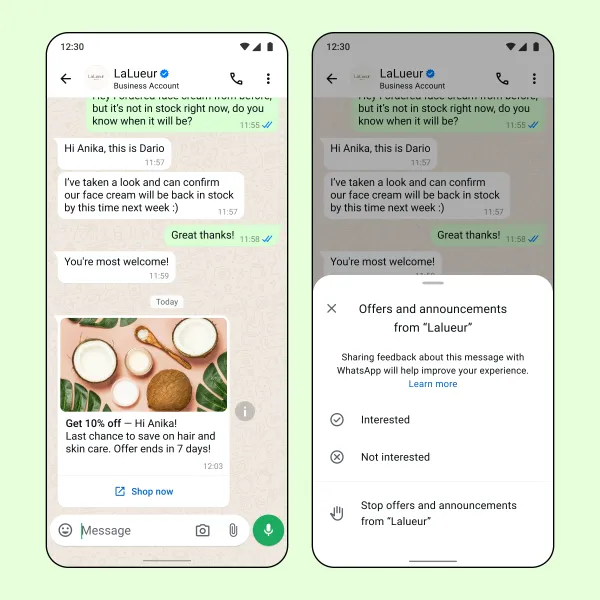Meta is expanding its WhatsApp Business capabilities with the introduction of business broadcasts – a paid feature that allows brands to re-engage customers who have previously interacted with them. While this opens up new promotional opportunities for businesses, Meta is taking a cautious, user-first approach to avoid the backlash that often comes with unsolicited brand messaging.
With more than two billion users worldwide and over 500 million in India alone, WhatsApp represents a vast, largely untapped opportunity for Meta. But monetising private messaging platforms has proven difficult, largely because of the fine line between relevance and intrusion. These latest updates reflect Meta’s ongoing effort to strike that balance.
What Are Business Broadcasts?
Business broadcasts are a new message type available on the WhatsApp Business app, designed to help companies send targeted offers and updates to people who’ve engaged with them in the past. Unlike standard messaging restrictions on WhatsApp, broadcasts allow businesses to push messages even outside of the typical session windows — but only to opted-in users.
These messages could include things like product announcements, back-in-stock alerts, event reminders or exclusive offers. Meta’s aim is to ensure these communications remain useful and expected, rather than disruptive.
Crucially, users have full control over whether they receive these messages. They can opt out of future messages directly from within the chat or indicate that they’re “Not interested” in specific offers. Meta uses this feedback to assess content quality and will penalise businesses that repeatedly send low-engagement or irrelevant messages.
Messaging Limits and Quality Controls
To reduce inbox fatigue, Meta has introduced daily limits on the number of marketing messages a user can receive from businesses. This aligns with WhatsApp’s broader approach: empowering users to manage their inboxes while enabling brands to send messages that are genuinely helpful.
Meta is also relying on message template approvals for those using the WhatsApp Business Platform (API). These templates are reviewed to ensure they comply with Meta’s quality standards, and businesses are required to follow best practices for timing, relevance and frequency.
Businesses that fail to meet these standards face a tiered penalty system, where repeated violations can lead to messaging restrictions of increasing severity. These enforcement measures are designed to keep user experience at the centre of WhatsApp’s growth strategy.
User Experience Remains the Priority
Meta’s messaging tools are built with user control in mind. From the ability to block or report businesses, to flexible opt-in options across digital and physical touchpoints, users are always aware when they’re communicating with a business. They can easily stop conversations or adjust preferences to tailor their inbox experience.
New feedback tools such as “Interested” and “Not interested” buttons offer more nuanced ways for users to interact with brand communications. This helps Meta better understand what users want — and gives businesses a chance to fine-tune their approach based on actual engagement signals.
Additionally, WhatsApp now supports reactivation of offers, meaning users can easily re-subscribe to receive updates from a brand if their preferences change. This flexibility supports long-term engagement rather than forcing it through persistent outreach.
Outbound Activity at Scale
For marketers, these updates create an opportunity to integrate WhatsApp into the customer lifecycle more meaningfully. Rather than relying on customer-initiated conversations, businesses can now proactively reach out — provided the user has opted in and the message content passes Meta’s checks.
Broadcasts offer a way to re-engage high-intent audiences who’ve shown interest in the past, without needing to run a full retargeting campaign through another channel. This could be particularly valuable for product launches, flash sales, or time-sensitive promotions.
Furthermore, businesses now have access to performance metrics such as read rates, helping them refine their message strategies over time. These insights will be essential in determining the right cadence and content for each segment.
Considerations Before Getting Started
While business broadcasts offer clear benefits, brands should approach them with care. Messaging limits and quality requirements mean marketers need to be selective about what they send and when. Messages must be timely, targeted, and value-driven.
To make the most of this opportunity:
-
Audit your customer journeys to identify points where WhatsApp broadcasts could add value.
-
Use segmentation to target messages based on past behaviour, interests, or purchase history.
-
Monitor feedback and performance metrics to avoid over-messaging and reduce opt-out rates.
-
Respect opt-out signals and ensure re-engagement messages are contextual and relevant.
Meta’s WhatsApp business updates mark a step forward in creating a structured, user-conscious messaging ecosystem for brands. By balancing paid promotional capabilities with strong user protections, Meta is building a model that could finally unlock WhatsApp’s monetisation potential — without compromising the trust that makes it one of the world’s most-used messaging apps.
For marketers, the key will be to treat WhatsApp as a high-touch, value-driven channel. With the right strategy, business broadcasts could become a powerful complement to email, SMS and in-app messaging — provided they’re executed with care and a clear focus on the customer experience.




RECOMMENDED FOR YOU
Meta Expands WhatsApp Ads With Status Click-To-Chat
Meta has taken a significant step in turning WhatsApp…
Meta has taken a significant step in turning WhatsApp…
Meta Expands Messaging Ads and AI Tools on WhatsApp
Meta has unveiled a series of significant updates to…
Meta has unveiled a series of significant updates to…
WhatsApp Ads Finally Launch
Meta has launched a major monetisation push for WhatsApp,…
Meta has launched a major monetisation push for WhatsApp,…